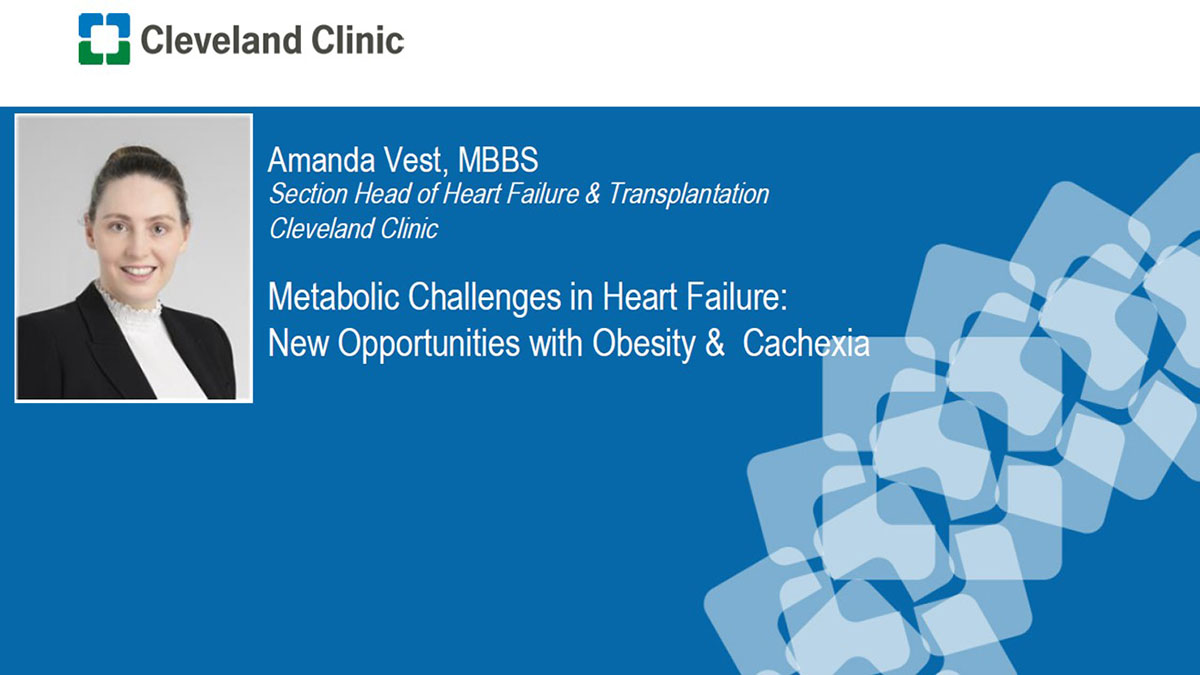Metabolic Challenges in Heart Failure

Amanda Vest, MBBS, discusses metabolic challenges in heart failure, new opportunities with obesity and cachexia.
Learn more about Cleveland Clinic's Center for Heart Failure Treatment and Recovery.
Subscribe: Apple Podcasts | Buzzsprout | Spotify
Metabolic Challenges in Heart Failure
Podcast Transcript
Announcer:
Welcome to Cleveland Clinic Cardiac Consult, brought to you by the Sydell and Arnold Miller Family Heart, Vascular and Thoracic Institute at Cleveland Clinic.
Samir Kapadia, MD:
Good morning, everybody. Welcome to our Grand Rounds. Today's a very special day also because we are going to have one of our new recruits as well as our heart failure section leader, Dr. Amanda Vest, present to us the very important and very novel area that metabolic challenges in heart failure, both hands from obesity and cachexia. So this is going to be a very important talk. Dr. Vest did her training in London in Imperial College, and then did a Public Health Masters in Harvard. Then she did her medical residency, she did it at BU. And then she came to us and did cardiology fellowship here, also did the heart failure fellowship here. And then she went to Tufts where she was the director of heart failure and transplant. And now she's back here with us. So we are very lucky to have her. Dr. Young, who is here, is a mentor of Dr. Vest but also mentor of many. So thank you very much Dr. Young for being here. And this is going to be a very nice presentation, so we are looking forward to it.
Amanda Vest, MBBS:
Well, thank you. I really appreciate the opportunity to share some of the areas that I've been thinking a lot over the last few years about, and I'm really interested in, and thank you ever so much for many of you here who have been absolutely instrumental in my training and getting into academics related to heart failure, especially Dr. Young. So thank you. So I'm hoping to share with you some ideas about how we may be moving forward in heart failure therapeutics through the next decade. Obviously, a huge amount of pharmacological research has occurred in the heart failure space, we have wonderful guideline-directed medical therapies that even a decade ago were not as robust as what they are now. But I still believe there are opportunities to really harness what's going on in terms of metabolism, nutrition, body composition and perhaps help our patients both to live longer and functionally do better.
My disclosures are here. These are the funding avenues that are related to the work that I'm going to present. And I am going to try and cover both ends of the spectrum. So obesity in patients with heart failure, which was my first research area as a general fellow here. And then it has informed some of my understanding now of metabolic wasting and the challenges of cardiac cachexia. And I hope to share with you some ideas about where we may be going with future therapeutic options on both ends.
So as you are well aware, there is a clear epidemiological link between obesity and heart failure development, even when adjusted for confounders with maintenance of a normal range BMI across the lifespan being a key component of our messaging about heart failure prevention. The risk really increasing above a BMI of around 30.
The strongest association between obesity is really with heart failure was preserved ejection fraction. As we see here, a relative risk of 1.41 per five kilogram meter squared of BMI increase, the risk with heart failure with reduced ejection fraction remains somewhat controversial. There are some nice Swedish papers about early life BMI and subsequent cardiomyopathy, but the incident relationship is the strongest with HFpEF. And here is one of my early systematic analyses with Dr. Young from back in the fellowship days, in which we were able to say that reducing weight doing a bariatric surgery substantially improved cardiac structure and diastolic function across this cohort of 713 subjects from 16 studies with improvements in the LV mass as well as markers of diastolic dysfunction. And importantly, the reduction in LV mass was independent of the reduction in systolic blood pressure. So there are clearly some opportunities here with reversal of obesity that may improve the structure and function of the heart and may prevent leading into a heart failure situation.
And indeed, subsequent to that, a number of epidemiological studies went on to show that indeed bariatric surgery can prevent heart failure. So we have these series of retrospective studies across Scandinavia and North America, with a variety of control groups, majority Roux-en-Y Gastric Bypass studies, majority female subjects within these studies, and a series of comparator groups that are either match controls or individuals undergoing a non-surgical weight management regimen. But interestingly, the findings are fairly consistent with an adjusted hazard ratio for heart failure development of around 0.5 or below for each of these studies.
We don't know much about the heart failure phenotype across these retrospective cohorts. However, given that they're female predominance, we can probably reasonably speculate that it's HFpEF rather than HFrEF, that is majority being prevented here. But we don't know the echoes and the specifics of what's going on. Now, although we're aware that maintaining a normal range BMI and even treating obesity with an intervention such as bariatric surgery is important when we're talking about prevention of heart failure. The controversy starts to arise when we talk about patients with established heart failure because for many, many years it's been observed that there is something of an obesity survival paradox. This is probably the largest meta-analysis of 41,000 patients with heart failure, and doesn't show a full U-curve, but does show that there may be some relative protection for those with the overweight or mild obesity BMI ranges. And so this has led us to some uncertainty about if you're meeting a patient with heart failure who has an elevated BMI, what should we tell them?
And as I go through the data over the following slides, I hope you'll agree with some of these rationales as to why we should be treating obesity for many of our patients with heart failure, HFrEF or HFpEF. We now have a fair amount of data to suggest that we can attain symptom relief. So symptoms such as edema, abdominal fullness, and improve heart failure related quality of life and reduce heart failure hospitalizations. We already know about the improvements in myocardial structural and function that I just shared, especially in terms of reducing LV mass and also actually RV mass based on some of the MRI studies from Oxford, as well as diastolic function. We know that managing significant obesity is very important to control other cardiometabolic conditions such as AFib, sleep apnea, CAD, and the severity or risk of diabetes. And of course, in our advanced heart failure setting, the promotion of a normal range BMI can be incredibly important for our younger patients with advanced HFrEF, who are otherwise really good candidates to receive a transplantation in future.
And indeed, it remains that an elevated BMI is an incredibly common reason for a patient who would otherwise really thrive with a heart transplant, not being able to move forward towards that therapy. And as I'll share in a moment, maybe there are some improvements in survival when treating severe obesity in a patient with established heart failure. Although this is only through retrospective cohort studies at the current time with a little bit of information just starting to come through from our anti-obesity medication studies, as you'll see. So when we're talking about managing obesity in a patient with established heart failure, we of course have the three domains of care: lifestyle, pharmacotherapies and bariatric surgery. In terms of lifestyle interventions, so incorporating dietary and or exercise approaches in patients with established heart failure, we have still a fairly sparse literature to base off of. And really these are still the only available randomized studies in this domain.
Most of them related to HFpEF with Dr. Kitzman doing some excellent work in this area. And only four of the studies shown here actually achieving significant weight loss. But you certainly see some hints coming through of improvements in quality of life, functional capacity and other meaningful endpoints. Exercise, although always recommended as part of an obesity management strategy is probably only minimally effective for weight management within patients with heart failure. So we can go back to the HF-ACTION study that randomized over 2000 patients with compensated HFrEF, half of whom did have obesity with a BMI of greater than 30. And this exercise training followed by home physical activity program did improve quality of life. But if you look in the obesity range, BMI is here, you see a very marginal impact on weight over the course of this study.
Announcer:
Thank you for listening. We hope you enjoyed the podcast. We welcome your comments and feedback. Please contact us at heart@ccf.org. Like what you heard, subscribe wherever you get your podcasts or listen at clevelandclinic.org/cardiacconsultpodcast.

Cardiac Consult
A Cleveland Clinic podcast exploring heart, vascular and thoracic topics of interest to healthcare providers: medical and surgical treatments, diagnostic testing, medical conditions, and research, technology and practice issues.



